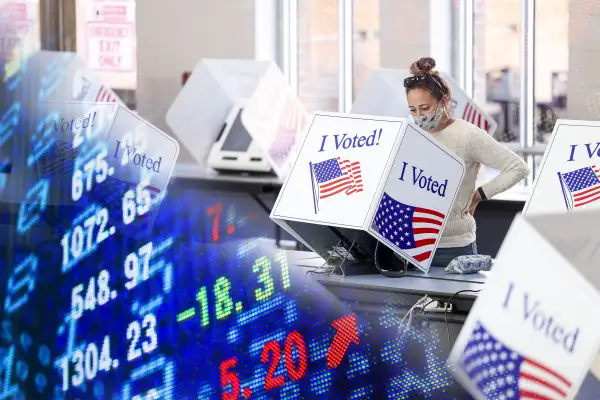Stocks Are Rallying as America Heads to the Polls. Here's What You Need to Know
Money is not a client of any investment adviser featured on this page. The information provided on this page is for educational purposes only and is not intended as investment advice. Money does not offer advisory services.

The markets rallied on election day as voters headed to the polls and anxious investors considered what the outcome could mean for pandemic stimulus and the economy overall.
The Dow Jones Industrial Average surged 555 points, or 2.1%, Tuesday. The S&P 500 gained 1.8%.
While Wall Street will likely be glued to their screens, it’s possible we won’t have concrete answers tonight, or for weeks. And that uncertainty is something markets tend to hate.
What investors are looking for
For months, investors — like most of the country — have been watching for action from Congress on a second stimulus package.
“Regardless of the election result, the US economy is on the path to recovery,” Jason Draho, head of asset allocation for the Americas at UBS Global Wealth Management wrote in a blog to clients Tuesday. “The pace will be affected by the timing and magnitude of additional fiscal stimulus, and that hinges on the election outcome.”
Most polls show Biden has a narrow lead in battleground states, and a Biden presidency could mean talks around stimulus resume quickly and Americans see more relief money. The Democrats' most recent proposal was a $2.2 trillion package, while the White House’s was almost $1.9 trillion. Despite Biden’s plans to raise taxes on corporations and wealthy Americans, Wall Street seems hopeful about what a bigger stimulus package could mean for the market.
What did the stock market do during past elections?
The market rally comes after the Dow and S&P 500 saw their biggest weekly sell-offs since March last week. But if the ups and downs are making your stomach hurt, remember that the market is often volatile around elections.
On election night four years ago, President Trump’s win over Democratic candidate Hillary Clinton seemed to take investors by surprise. Futures for the Dow Jones Industrial Average plummeted as much as 750 points as Trump raked in wins from key states, like Florida and Ohio. But the next morning the market told a different story: the Dow soared to a record high as Wall Street backtracked from its gut reaction.
Back in 2008, former President Barack Obama’s victory sent the Dow tumbling nearly 500 points. It then led to the biggest market slump between Election Day and Inauguration Day as the S&P 500 Index dove nearly 20%, MarketWatch reported in 2016 (although keep in mind, that was during the heart of the financial crisis). It took a bit longer for the market to reverse during that presidency, but it eventually did: in March 2009, the market started to pick up, leading to what we now know was a decade-long bull market.
The upshot: Investors tend to have a knee-jerk reaction to presidential election results, but it’s not necessarily predictive of the market’s future.
What should you do?
Even though volatility spikes around elections, the results likely won’t have an impact on long-term investors. Investment company Vanguard found that stock market returns are almost identical no matter who wins the presidency — the average annual U.S. equity returns between 1853 and 2015 were 10.7% with a Democrat in the White House and 10.5% with a Republican.
So what should you do? In short: not much. Trying to time the market is never a good idea, and those who tried to do so during past elections would have been much better served staying the course, says Doug Harbaugh, a wealth advisor at Strategic Wealth Partners.
“If you think of investing like a home run hitter, you’re going to strike out far more times than you will actually hit home runs,” Harbaugh says. “Being a consistent, balanced investor that rebalances on a consistent basis will do far better than somebody trying to find that next big thing.”
Having a well-balanced, diversified portfolio will help you when volatility like this hits, but it also ensures that major swings in certain sectors following the outcome of the election won’t tank all your investments. So while you shouldn’t panic, about what election results mean for your portfolio, checking in on your investments and rebalancing regularly will go a long way.
“When you have a retirement plan and long-term goals, you need to stick to those things based on your circumstances and try to kind of put on earmuffs and block out the outside noise,” Harbaugh says.
This story has been updated to reflect market moves Tuesday afternoon.
More from Money:
Trump vs. Biden: How the 2020 Election Results Will Affect the Stock Market
Election Day 2020 and Your Money: Trump vs. Biden on 401(k)s, Taxes and Other Key Issues
5 Election Day Scenarios That Could Affect Your Next Stimulus Check
